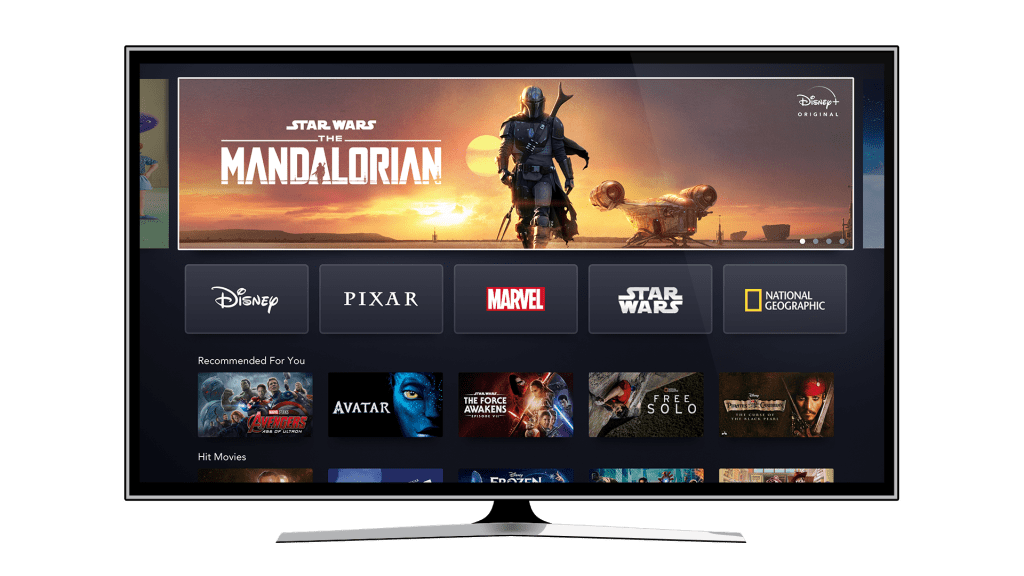Disney+, the streaming service from the Walt Disney Company, has been rapidly ramping up in the last several weeks. But while some of that expansion has seen some hiccups, other regions are basically on track. Today, as expected, Disney announced that it is officially launching across 7 markets in Europe — but doing so using reduced bandwidth given the strain on broadband networks as more people are staying home because of the coronavirus pandemic. From today, it will be live in the U.K., Ireland, Germany, Italy, Spain, Austria and Switzerland; Disney also reconfirmed the delayed debut in France will be coming online on April 7. It’s the largest multi-country launch so far for the service.
“Launching in seven markets simultaneously marks a new milestone for Disney+,“ said Kevin Mayer, Chairman of Walt Disney Direct-to-Consumer & International, in a statement. “As the streaming home for Disney, Marvel, Pixar, Star Wars, and National Geographic, Disney+ delivers high-quality, optimistic storytelling that fans expect from our brands, now available broadly, conveniently, and permanently on Disney+. We humbly hope that this service can bring some much-needed moments of respite for families during these difficult times.”
Pricing is £5.99/€6.99 per month or £59.99/€69.99 for an annual subscription. Belgium, the Nordics, and Portugal, will follow in summer 2020.
The service being rolled out will feature 26 Disney+ Originals plus an “extensive collection” of titles (some 500 films, 26 exclusive original movies and series and thousands of TV episodes to start with) from Disney, Pixar, Marvel, Star Wars, National Geographic, and other content producers owned by the entertainment giant, in what has been one of the boldest moves yet from a content company to go head-to-head with OTT streaming services like Netflix, Amazon and Apple.
Caught in the crossfire of COVID-19
The expansion of Disney+ has been caught in the crossfire of world events.
The new service is launching at what has become an unprecedented time for streaming media. Because of the coronavirus pandemic, a lot of of the world is being told to stay home, and many people are turning to their televisions and other screens for diversion and information.
That means huge demand for new services to entertain or distract people who are now sheltering in place. And that has put a huge strain on broadband networks. So, to be a responsible streamer (and to make sure quality is not too impacted), Disney confirmed (as it previously said it would) that it would be launching the service with “lower overall bandwidth utilization by at least 25%.”
There are now dozens of places to get an online video fix, but Disney has a lot of valuable cards in its hand, specifically in the form of a gigantic catalog of famous, premium content, and the facilities to produce significantly more at scale, dwarfing the efforts (valiant or great as they are) from the likes of Netflix, Amazon and Apple.
Titles in the mix debuting today include “The Mandalorian” live-action Star Wars series; a live-action “Lady and the Tramp,” “High School Musical: The Musical: The Series,”; “The World According to Jeff Goldblum” docuseries from National Geographic; “Marvel’s Hero Project,” which celebrates extraordinary kids making a difference in their communities; “Encore!,” executive produced by the multi-talented Kristen Bell; “The Imagineering Story” a 6-part documentary from Emmy and Academy Award-nominated filmmaker Leslie Iwerks and animated short film collections “SparkShorts” and “Forky Asks A Question” from Pixar Animation Studios.
Some 600 episodes of “The Simpsons” is also included (with the latest season 31 coming later this year).
With entire households now being told to stay together and stay inside, we’re seeing a huge amount of pressure being put on to broadband networks and a true test of the multiscreen approach that streaming services have been building over the years.
In this case, you can use all the usuals: mobile phones, streaming media players, smart TVs and gaming consoles to watch the Disney+ service (including Amazon devices, Apple devices, Google devices, LG Smart TVs with webOS, Microsoft’s Xbox Ones, Roku, Samsung Smart TVs and Sony / Sony Interactive Entertainment, with the ability to use four concurrent streams per subscription, or up to 10 devices with unlimited downloads. As you would expect, there is also the ability to set up parental controls and individual profiles.
Carriers with paid-TV services that are also on board so far include Deutsche Telekom, O2 in the UK, Telefonica in Spain, TIM in Italy and Canal+ in France when the country comes online. No BT in the UK, which is too bad for me (sniff). Sky and NOW TV are also on board.
































Comment